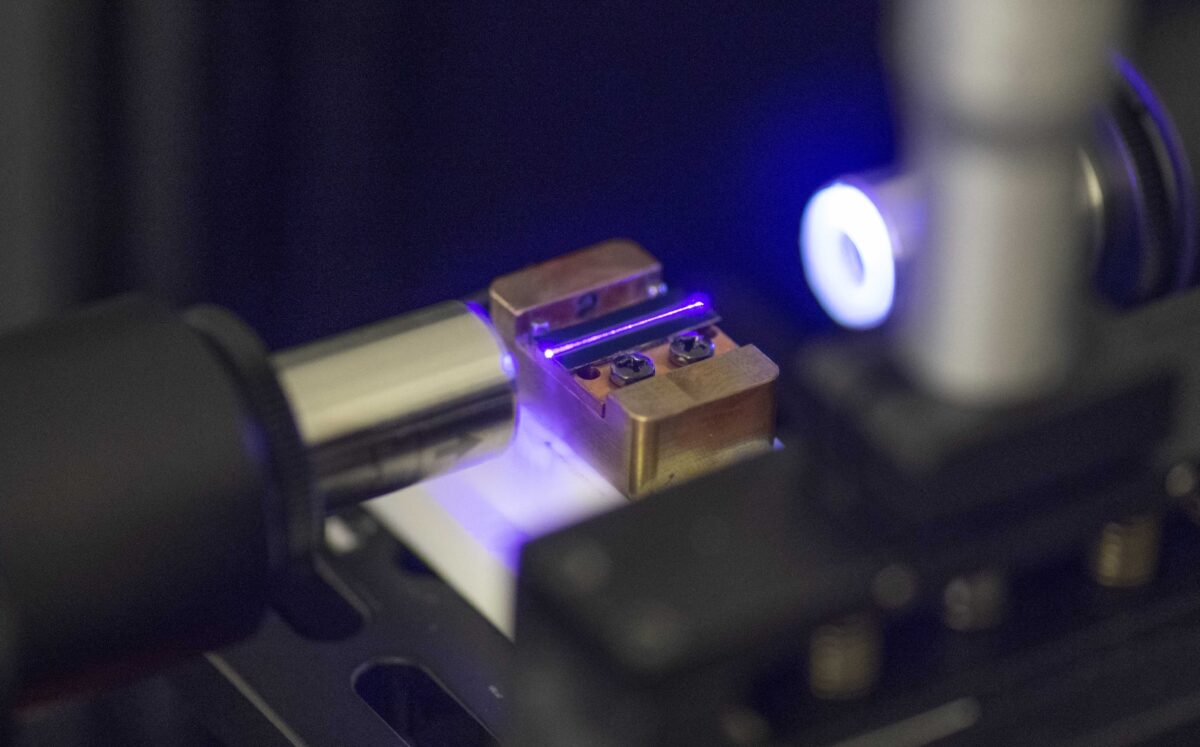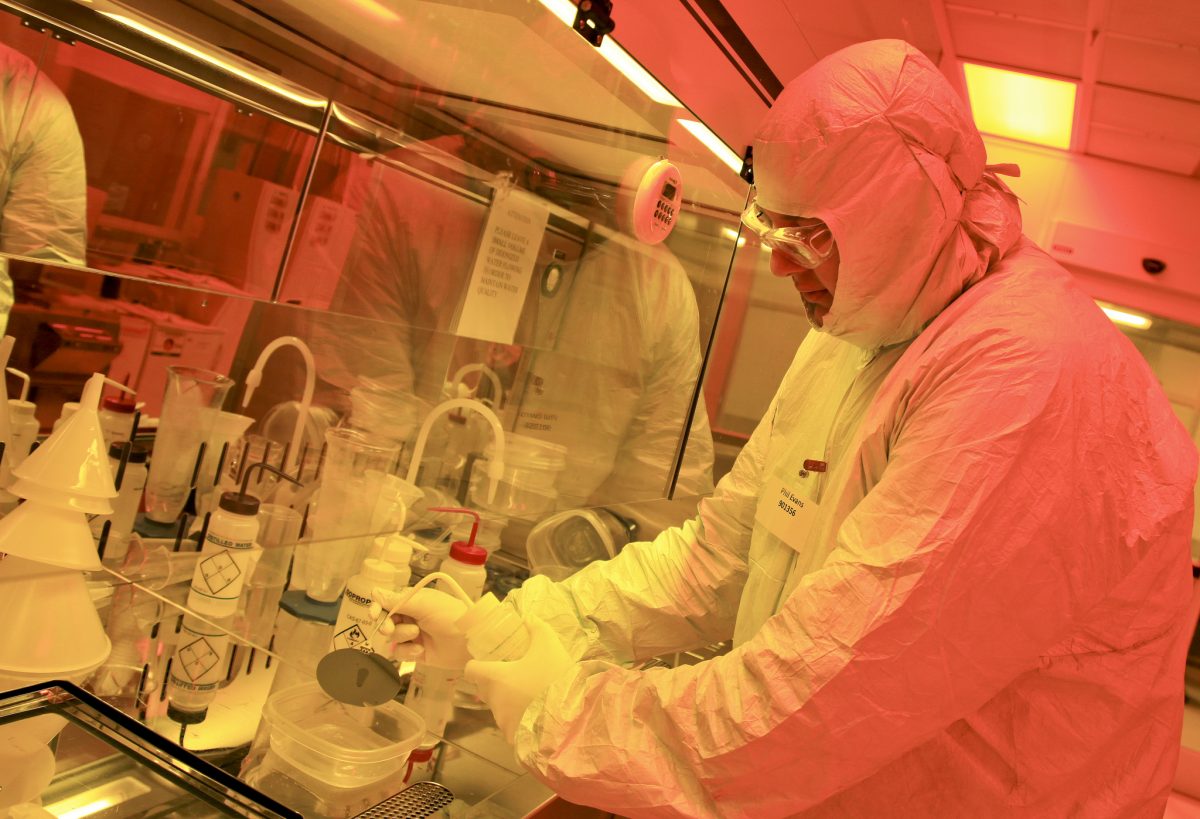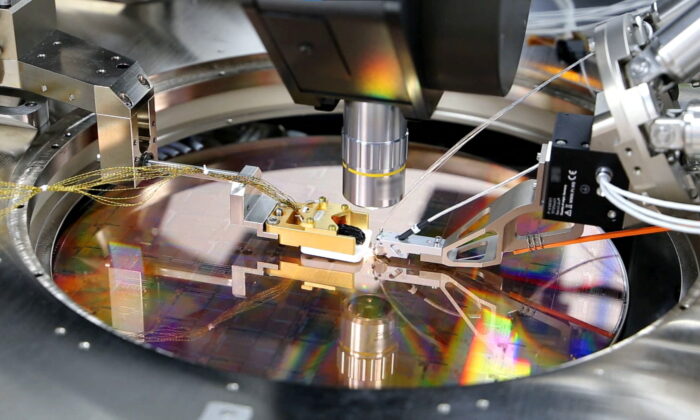March 2, 2023 Updated: March 9, 2023
A view of a PsiQuantum
Wafer, a silicon wafer containing thousands of quantum devices, including
single-photon detectors, manufactured via PsiQuantum's partnership with
GlobalFoundries in Palo Alto, Calif., U.S., in an undated photo taken in March
2021. (PsiQuantum/Handout via Reuters)
Your passwords, your
credit cards, your bank accounts, and your emails all belong to China’s
communist regime.
It isn’t a reality yet,
but the Chinese Communist Party (CCP) is working tirelessly to ensure that it
becomes so.
To achieve that reality,
the regime is increasingly turning to quantum computing to process previously
unfathomable amounts of data. Its goal is to break the RSA encryption used to
protect most of the information stored online.
Quantum computing’s
potential to wholly shatter the encryption that safeguards so much of the
world’s data has long been feared, but most believed that the threat was still
a decade away at least.
However, a December 2022
paper co-written by 24 researchers from numerous academic bodies and
state-owned laboratories in China claims to have developed a method to do just
that.
The paper (pdf), titled “Factoring integers with
sublinear resources on a superconducting quantum processor,” claims that
researchers in China have developed a method to break the RSA algorithm used by
most online encryption systems by using quantum computing to improve upon
code-breaking algorithms.
Specifically, the paper
claims that an algorithm developed by mathematician Claus-Peter Schnorr last
year, which couldn’t be scaled on classical computers, could effectively be
implemented by offloading some of the most time-consuming processes to a
quantum system.
The incident highlights
not only that China has taken one more step toward total domination of the
online ecosystem but also the unique role that hybrid quantum-classical systems
will have in ushering forward a new era of security uncertainty.

Hybrid
Systems Are the Next Threat
Regardless of the success
of Schnorr’s algorithm, the episode presents new evidence that the CCP and its
many state-owned research bodies are seeking to leverage the high-stakes field
of quantum computing to undermine and displace the United States, according to
Arthur Herman, a senior fellow at the Hudson Institute, a conservative think
tank.
“What it establishes is
that they are working very hard on two aspects of the quantum race with the
United States,” Herman said. “One is developing their own quantum computer
technology including quantum computers that would be able to eventually decrypt
systems both symmetric and asymmetric.
“On the other hand,
they’re very busy hardening their own sites and protecting themselves against
that type of decryption effort on the part of the United States.”
Herman, who also oversees
Hudson’s Quantum Alliance Initiative, said hybrid quantum-classical machines
would be an integral aspect of the quantum race between the liberal
international order and authoritarian regimes the world over.
A quantum bit, or qubit,
is a basic unit of quantum information used by quantum computers. Whereas
traditional processors use regular bits, which can be turned on or off to
create binary code, qubits can be turned on, off, or both on and off
simultaneously in a phenomenon known as superposition.
The existence of this
third state will allow quantum processors to achieve much quicker processing
speeds than their traditional counterparts, but getting the two systems to work
together is tricky.
By connecting a quantum
system with a classical system, researchers can effectively leverage the raw
power of one with the stability of the other.
To that end, Herman
authored a report (pdf) for the Hudson
Institute late last year that explored how the creation of hybrid systems using
quantum and classical computers for various tasks could catapult the field
forward into uncharted and likely dangerous new territories.
“The true path to the
quantum future is the combination of quantum and classical digital technology,
especially in computing, which will powerfully accelerate access to the
potential benefits of quantum information science.” the report reads.
“In short, ‘hybrid’
computation creates a collaboration in which users run different aspects of a
problem through the quantum and classical components within the system. The
division of labor depends on which system is best suited to solve a particular
aspect of the problem.”
The Chinese researchers
who authored their paper on Schnorr’s algorithm proposed just such a system,
saying that “practical quantum advantage” could be obtained by delegating key
complex tasks to a quantum machine while using a classical system for the rest
of the processes.
Although the researchers
themselves used only a small portion of the quantum power that would be needed
to break RSA encryption outright, they reported that their model could be
sufficiently scaled and was likely to succeed “in the near future.”
“What they’ve done is
they’ve linked up their quantum components for their research … with classical
computing,” Herman said. “In other words, it’s a hybrid system that they’re
using.
“The idea that you have to
wait until you have a big, monolithic quantum computing system [to break
encryption] … I think is becoming exposed as false.”

Propaganda
Victory and the CCP’s Research ‘Behind Closed Doors’
Because CCP laws
designate data as a national resource and enable the regime to collect any data
in the possession of an entity within China for national security purposes, any
research conducted, algorithms invented, or data gleaned by cracking RSA will
ultimately belong to the regime.
That the paper published
in December 2022 involved researchers from state-owned institutions and was
widely telegraphed rather than conducted with any modicum of secrecy
demonstrated a wider ambition of the CCP, Herman said.
“What [this paper] really
shows is that they’re not doing this in a sort of stealth way,” he said.
“They see this as a way
to really proclaim just how tough and how serious they are about this quantum
decryption effort.”
Herman previously
described the race toward quantum supremacy as a search for an “ultimate weapon,” and
has compared the effort to the Manhattan Project, which resulted in the
creation of the first atomic bomb.
While the paper is no
atomic bomb, it may be a smoking gun, and he fears that the regime could be
working on far more complex research behind the scenes as part of its effort to
undermine and eventually displace the United States.
“This is going to
increasingly be a part of their strategic offensive against the United States
and against the West,” Herman said.
“We should take it very
seriously, even if the announcement itself is not something we have to worry
about in the near term.”
To that end, he said the
regime had definitely won a propaganda victory with the paper and could use its
advances in quantum computing to inspire fear the world over, but its unknown
projects could be much more threatening.
“These are all scientific
papers that are being published widely,” Herman said.
“This is what the [CCP]
is telling us that they’re doing. We don’t really know what it is that they are
doing behind closed doors.”
As such, although Herman
believed just last year that world-altering breakthroughs in quantum computing
would be a product of the 2030s, he said this most recent development has
forced him to truncate that timeline.
The realization of an
effective hybrid system at this stage means that the CCP could be much further along,
and encryption-breaking efforts could appear in the next few years, he said.
Unrestricted
Warfare
For retired U.S. Air
Force Brig. Gen. Robert Spalding, the CCP’s rush toward quantum supremacy is
just one more tool in the regime’s multipronged attack on the United States.
Rather than an ultimate
weapon, Spalding considers quantum computing to be part of the regime’s much
larger campaign of “unrestricted warfare,” through which it seeks to leverage
every nonmilitary means at its disposal to garner real military advantage over
the United States.
“The Chinese have been
vacuuming up data for a long time in hopes of having a powerful enough quantum
computer to crack the RSA encryption,” he said.
“That being said, the
technique mentioned in the paper does not necessarily confer advantage until
and unless it is able to be usefully accessed by those that have an interest in
the data they have collected.”
To that end, Spalding
believes that the AI required to sort and make sense of the immense amount of
data that quantum is capable of gleaning is more important than the means to
acquire it.
At any rate, he connected
both AI and quantum to the CCP’s ambition to build out and operate a state
based on “data-powered authoritarianism,” which required the regime to amass
data through legal, quasi-legal, and illicit means.
“Taking unrestricted
warfare into account lets us see that it is the evolution of technology and
particularly the internet with its vast amount of data, which is the binding
agent for all things that give incredible advantages to any authoritarian who
would wield it correctly,” Spalding said.
“Quantum is merely a
tool. It can allow for communications that cannot be listened in to and can be
used to do things like crack modern encryption. For the purposes of the
dominance of the CCP, artificial intelligence is much more important and
powerful than quantum technologies.”
Asked how the United
States could prevent or even slow the regime’s march toward owning the data of
all Americans, he was less than optimistic.
So long as the CCP regime
controlled China, its military-civil fusion strategy would mandate that U.S.
technology and research effectively be co-opted against the international
order, according to Spalding.
This problem presents a
unique challenge to the United States and like-minded democratic states, he
said, as their open nature renders their economic, political, and media systems
innately vulnerable to CCP propaganda, IP theft, and coercion.
In such a scenario,
Spalding said, the only path the United States could follow toward victory was
to decouple and cut off the regime’s access to U.S. markets, media, and
technology altogether.
“During the Cold War, we
were effectively able to keep technology from Soviet hands by decoupling the
economies. By coupling China to ours we have given them the ability to defeat
us with our own system,” he said.
“The fact that the CCP
can rely on America for talent, technology, and capital ensures that any
advantage the U.S. has because people are given the latitude to create also
goes to benefit China. There is no separation.”
US
Must Prepare for Decades of Quantum Defense
For his part, Herman
wasn’t so sure that decoupling was the future.
Although national leaders
were slow to act at first, the United States isn’t without its own efforts to
defend against the quantum threat, and Herman noted that the Biden
administration had “stepped up” its efforts to prepare the nation for a quantum
future.
Particularly, he
commended the Biden administration for passing the Quantum Computing
Cybersecurity Preparedness Act, which orders government agencies to begin the
process of transition to “post-quantum cryptography.”
“It takes a long time to
migrate to post-quantum cryptography, and making systems quantum-safe is going
to take time and effort and resources,” Herman said.
“The Biden
administration, much to their credit, has been really stepping up this last
year with regard to making government agencies quantum-safe and quantum-secure.
The next step is that we’ve got to get the private sector and the private
companies including our banks and power companies to get serious about making
themselves quantum-ready and quantum-secure.”
The battle isn’t yet won,
however, and he believes that the war for quantum dominance will be one borne
out through stiff competition and innovation over the course of decades. The
victor of which will shape the future of the world.
“This is going to be
decisive in the next couple of decades,” Herman said. “We still have time, but
we may not have quite as much time as we used to think before that threat
becomes imminent.
“An article like this is
another straw in the wind. It’s another indication that that day is coming and
we need to really focus on this now as a way to protect our economy and
national security and to think about how we can deter a threat like China.”

No comments:
Post a Comment